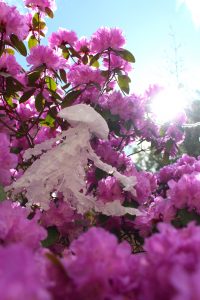 Katherine Page ’23
Katherine Page ’23
Major(s): Biology, Minor: Hispanic Studies
Dining hall takeout bags, string, scotch tape
16in x 54in (large), 4in x 16in (small) (click image to enlarge)
Plastic bags and other macro plastics closely resemble jellyfish, algae, and other species that make up a large portion of sea turtles’ diets. 52% of the world’s sea turtles have eaten plastic waste, and 22% of sea turtles that eat plastic only once are at risk of death: sharp plastics rupture internal organs and bags block the digestive system, leading to starvation.
It is now widely known that non-degradable plastics and micro plastics are a serious threat to our ocean and its inhabitants, but still, as of 2020, 8.3 million tons are discarded in the sea yearly. The plastic bags used in “Sea turtles will eat them” are made by one of EPI’s “100% degradable” OxoGreen plastics, attempting to lower the risk of harm to our planet. Although the bags claim to be nature friendly, they are oxo-degradable, meaning that they break down into micro plastics and are still at risk of harming our ocean wildlife.
“Sea turtles will eat them” is a call for transparency and genuine effort within plastic companies to use products that can protect the nearly 700 species that regularly ingest or get caught in plastic.